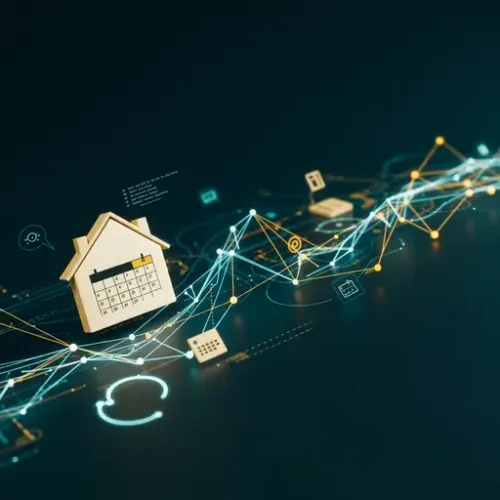Mastering Calendar Integration in Home Assistant: Schedule-Driven Automation for Your Smart Home

NGC 224
DIY Smart Home Creator
The Power of Context: Beyond Simple Time Triggers
In the realm of smart home automation, simple time-based triggers (e.g., "turn on lights at sunset") are foundational. However, true intelligence emerges when your home understands the context of your life. This is where Home Assistant's calendar integration shines. By connecting your personal and shared calendars, you can create dynamic automations that adapt to your appointments, work schedules, travel plans, and even recurring household tasks. Imagine your lights dimming automatically when a movie starts according to your calendar, or your heating adjusting pre-emptively for your return from a trip.
Getting Started: Supported Calendar Integrations
Home Assistant offers robust support for various calendar types, allowing you to pull in events from almost any source. Each integrated calendar exposes an entity that tracks its current status (whether an event is active) and provides attributes about upcoming events.
Google Calendar Integration
Google Calendar is one of the most popular choices due to its widespread use and ease of integration. The preferred method for setup is via the Home Assistant UI.
- Go to Settings > Devices & Services.
- Click + Add Integration and search for "Google Calendar".
- Follow the on-screen instructions to authorize Home Assistant with your Google account. This typically involves a browser-based OAuth flow where you grant Home Assistant access to your calendars.
- Once authorized, you can select which specific calendars from your Google account you wish to expose to Home Assistant.
For advanced users or if you prefer YAML, you can still configure it in your configuration.yaml. This allows for more granular control over which specific calendars are pulled in and their names.
# configuration.yaml
google:
client_id: YOUR_CLIENT_ID
client_secret: YOUR_CLIENT_SECRET
# To get client_id and client_secret, follow Google API Console steps.
# This method is less common now but still supported for specific needs.
After initial setup, you might want to filter events or customize entity names using calendar.yaml:
# calendar.yaml (referenced from configuration.yaml)
- platform: google
calendar_id: [email protected]
name: My Personal Calendar
track_new_calendar: true # Automatically add new calendars discovered
entities:
- device_id: work_schedule
name: Work Schedule
track: true
search: "Work"
- device_id: family_events
name: Family Events
track: true
search: "Family"
CalDAV Integration (Nextcloud, Apple iCloud, Synology Calendar, etc.)
CalDAV provides a standardized way to access calendar data from various services. This is configured directly in your configuration.yaml.
# configuration.yaml
caldav:
- url: "https://your.caldav.server/dav/calendars/user/calendar_name/"
username: your_username
password: your_password
name: My Nextcloud Calendar
# Verify SSL certificate (optional, defaults to true)
verify_ssl: true
# Timeout in seconds (optional, defaults to 10)
timeout: 30
Ensure the URL points directly to your calendar's CalDAV endpoint. You might need to consult your CalDAV provider's documentation for the exact URL format.
Local Calendar
For events exclusive to your smart home or for simple, recurring tasks that don't need external syncing, Home Assistant's built-in local calendar is perfect. These are managed entirely within Home Assistant.
- Go to Settings > Devices & Services > Helpers.
- Click + Create Helper and choose "Calendar".
- Give it a name (e.g., "Trash Day Schedule", "Maintenance Reminders").
- Once created, you can add events directly to this calendar from the UI.
Accessing Calendar Data: Entities and Attributes
Each integrated calendar creates a calendar. entity. The state of this entity is 'on' if an event is currently active, and 'off' otherwise. More importantly, these entities expose a wealth of attributes that are crucial for advanced automations:
all_day: Boolean, true if the event lasts all day.message: The event's summary (title).description: The full event description.start_time: The event's start time (ISO 8601 format).end_time: The event's end time.location: The event's location.next_event: An object containing attributes of the very next upcoming event (message, start_time, etc.). This is incredibly powerful for proactive automations.
Building Schedule-Driven Automations
With your calendars integrated, let's explore how to create intelligent automations.
Basic Automation: Lights for Scheduled Meetings
Suppose you want your office lights to turn on and set a specific brightness when a meeting starts, but only if it's not an all-day event.
automation:
- alias: 'Office Lights for Meetings'
description: 'Turn on office lights when a calendar meeting starts'
trigger:
- platform: calendar
event: start
entity_id: calendar.your_work_calendar
condition:
- condition: template
value_template: "{{ not trigger.calendar_event.all_day }}"
- condition: time
after: '06:00:00' # Only during active hours
before: '22:00:00'
action:
- service: light.turn_on
target:
entity_id: light.office_desk_light
data:
brightness_pct: 75
- service: light.turn_on
target:
entity_id: light.office_ceiling_light
data:
brightness_pct: 60
Advanced Automation: Pre-empting Travel & Home Preparation
Using the next_event attribute allows for proactive automations, like setting your HVAC or water heater to a 'home' mode a few hours before you return from a trip.
automation:
- alias: 'Prepare Home Before Return from Travel'
description: 'Adjust HVAC and water heater before arriving home from travel'
trigger:
- platform: template
value_template: >
{% set next_event = state_attr('calendar.my_travel_calendar', 'next_event') %}
{% if next_event and next_event.message == 'Return Home' %}
{% set start_time = as_timestamp(next_event.start_time) %}
{% set time_until = (start_time - now().timestamp()) / 3600 %}
{{ time_until > 0 and time_until < 4 }} # Trigger 0-4 hours before return
{% else %}
false
{% endif %}
for: '00:01:00' # Check every minute
condition:
- condition: state
entity_id: input_boolean.home_away_mode
state: 'off' # Only run if currently in 'away' mode
action:
- service: climate.set_hvac_mode
target:
entity_id: climate.thermostat
data:
hvac_mode: heat_cool
- service: water_heater.set_operation_mode
target:
entity_id: water_heater.main_water_heater
data:
operation_mode: electric_heat_pump
- service: system_log.write
data:
message: "Preparing home for return from travel based on calendar event."
level: info
You can also use template sensors to create simpler states for conditions:
# sensors.yaml
- platform: template
sensors:
is_vacation_day:
friendly_name: "Is Vacation Day"
value_template: "{{ is_state('calendar.my_travel_calendar', 'on') and is_state_attr('calendar.my_travel_calendar', 'all_day', true) }}"
Then use condition: state, entity_id: sensor.is_vacation_day, state: 'on' in other automations.
Best Practices for a Reliable Calendar Smart Home
To maximize the utility and reliability of your calendar-driven automations, consider these best practices:
-
Dedicated Calendars for Automation Categories
Instead of cramming everything into one personal calendar, create specific calendars for different automation categories (e.g., "Home Automation: Lighting Schedules," "HVAC Away Dates," "House Maintenance"). This keeps your automations organized and prevents unintended triggers.
-
Leveraging Helpers for Control and Clarity
Use Input Booleans to easily enable/disable entire sets of calendar automations. For instance, an
input_boolean.enable_workday_automationscan turn off all work-related calendar triggers on holidays. Template Sensors, as shown above, can distill complex calendar logic (e.g., "Is there a meeting in the next 30 minutes?") into simpletrue/falsestates, making your automation conditions cleaner. -
Granular Event Control with Attributes
Don't just trigger on a calendar event starting. Use event attributes (
message,description,location,all_day) within conditions or templates to ensure your automation only runs for the exact type of event you intend. For example, a "Meeting" in your calendar might trigger different actions than a "Doctor Appointment" or an "All Day Holiday". -
Privacy and Security Considerations
Be mindful of the level of calendar access you grant. For highly sensitive information, consider using local calendars or external calendars with minimal detail, relying on event summaries for triggers rather than full descriptions. Regularly review the permissions granted to Home Assistant for external calendar services.
-
Resilience and Fallbacks
Cloud-based calendar services can sometimes experience outages. For critical automations, consider local overrides or simple time-based fallbacks. For instance, if your "Workday" calendar automation fails, ensure your lights still turn on at a default time.
-
Thorough Testing with Test Events
Before relying on calendar automations, create test events in your calendar (e.g., an event starting in 5 minutes) to confirm that triggers fire, conditions are met, and actions execute as expected. Test edge cases, like all-day events vs. timed events.
Conclusion
Integrating your calendars with Home Assistant transforms your smart home from a collection of reactive devices into a truly intelligent, context-aware assistant. By understanding your schedule, your home can anticipate your needs, automate routine tasks, and free up your mental load. By following the setup steps and best practices outlined, you'll unlock a new dimension of home automation, making your smart home an indispensable part of your daily life.

NGC 224
Author bio: DIY Smart Home Creator
